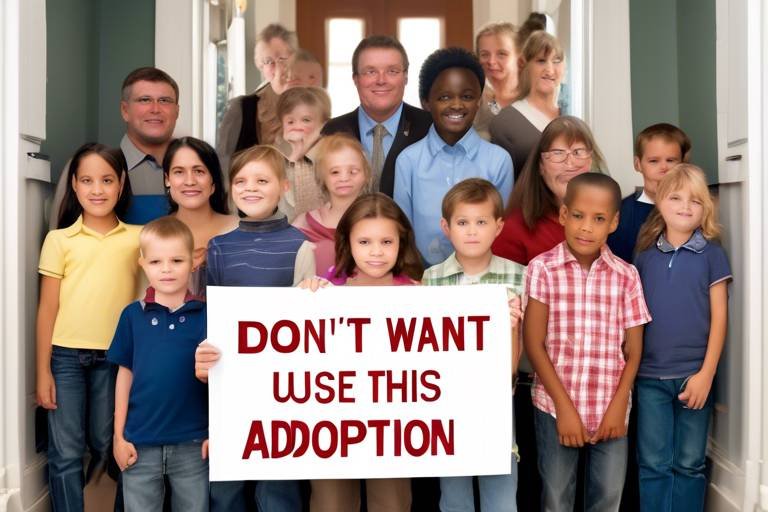The Role of Local Governments in Supporting Adoption
When it comes to adoption, local governments are like the unsung heroes behind the scenes, working tirelessly to create a nurturing environment for children in need of loving homes. Their role is not just about policies and regulations; it’s about building a community where families can thrive and children can find stability. Local governments have the unique ability to connect resources, foster relationships, and implement programs that make a significant difference in the adoption process. They pave the way for families to navigate the often complex world of adoption, ensuring that every child has the chance to grow up in a safe and loving environment.
One of the most important ways local governments support adoption is through the development and enforcement of adoption policies. These policies ensure that the best interests of children are prioritized, creating a framework that guides how adoptions are conducted. Local governments work closely with state and federal regulations to ensure that their policies are in alignment, thereby protecting the rights of both children and adoptive parents. This collaboration is essential, as it not only provides legal backing but also promotes consistency in adoption practices across various regions.
Moreover, local governments play a pivotal role in raising community awareness about adoption. They understand that for adoption to be successful, it requires a collective effort from the entire community. Through various initiatives, they aim to educate the public about the importance of adoption, especially for children in foster care. This is where community engagement becomes vital. By hosting events, distributing informational materials, and leveraging social media, local governments can spark conversations about adoption, dispelling myths and encouraging families to consider this rewarding journey.
As we delve deeper into the specifics of how local governments support adoption, it becomes clear that their involvement extends beyond just policies and awareness. They actively engage with families and children, providing the necessary resources and support to ensure successful adoptions. From financial assistance programs to partnerships with adoption agencies, local governments are committed to making the adoption process as smooth as possible.
In summary, the role of local governments in supporting adoption is multifaceted and deeply impactful. They are not just facilitators of the adoption process; they are advocates for children and families, ensuring that every child has the opportunity to grow up in a loving home. By understanding their responsibilities and engaging the community, local governments can create a more supportive environment for adoption, paving the way for brighter futures for countless children.
- What specific programs do local governments offer to support adoption? Local governments may offer financial assistance, educational workshops, and community awareness campaigns to support adoption.
- How do local governments collaborate with adoption agencies? They work together to streamline processes, share resources, and implement joint initiatives aimed at supporting families throughout the adoption journey.
- Are there any eligibility requirements for financial support programs? Eligibility can vary by program, but generally, local governments assess the financial need of the adopting family and the specific costs associated with the adoption.
- How can I get involved in local adoption awareness initiatives? You can reach out to your local government or adoption agencies to learn about volunteer opportunities, community events, and ways to spread awareness.

Understanding Adoption Policies
When we talk about adoption, it's essential to understand that local governments play a pivotal role in shaping the landscape of adoption policies. These policies are not just a set of rules; they are the framework that ensures the well-being of children and families throughout the adoption process. Local governments are responsible for establishing and enforcing laws that govern adoption practices, which can vary significantly from one region to another. This means that prospective adoptive parents must navigate a complex web of regulations that can sometimes feel overwhelming.
At the heart of these policies is a commitment to protecting the rights of children while also supporting families who are eager to provide loving homes. Local governments work to create a legal environment that prioritizes the best interests of the child. This often involves conducting thorough background checks on prospective parents, ensuring that homes are safe and nurturing, and providing resources for families who may face challenges during the adoption process.
Moreover, local governments often collaborate with various stakeholders, including adoption agencies, social workers, and community organizations, to develop comprehensive policies that address the diverse needs of children in foster care. For instance, many regions have specific regulations that outline the process for adopting children with special needs, recognizing that these adoptions may require additional support and resources. This collaborative approach not only enhances the effectiveness of adoption policies but also fosters a sense of community responsibility towards vulnerable children.
To give you a clearer picture, here’s a brief overview of some common components of local adoption policies:
| Policy Component | Description |
|---|---|
| Eligibility Criteria | Determines who can adopt based on age, marital status, and background checks. |
| Home Studies | Evaluates the suitability of the adoptive home through assessments and interviews. |
| Post-Adoption Support | Provides ongoing resources and assistance to families after the adoption is finalized. |
| Special Needs Adoption | Outlines additional support for families adopting children with disabilities or other special requirements. |
Understanding these policies is crucial for anyone considering adoption. It can feel like a maze at times, but local governments are there to guide families through each step of the process. They often provide information sessions, resources, and direct assistance to help prospective parents navigate the complexities of adoption laws. By fostering transparency and accessibility, local governments can demystify the process and encourage more families to consider adoption as a viable and rewarding option.
In conclusion, the role of local governments in shaping adoption policies cannot be overstated. Their commitment to creating a supportive legal framework not only protects children but also empowers families to embark on the beautiful journey of adoption. By understanding these policies, prospective adoptive parents can approach the process with confidence, knowing that they have the support of their local government behind them.

Community Awareness and Education
Raising awareness about adoption is essential for encouraging community involvement. Local governments have a unique opportunity to be at the forefront of this initiative, acting as catalysts for change and understanding within their communities. By implementing various educational programs, they can demystify the adoption process and highlight its importance for children in foster care. Imagine a community where every resident understands the joys and challenges of adoption—this is the vision local governments strive to achieve.
One of the most effective methods local governments utilize to promote adoption awareness is through workshops and seminars. These events serve as a platform for prospective adoptive parents to learn about the adoption process, legal requirements, and the emotional aspects of bringing a child into their home. By participating in these sessions, families can engage in open discussions, ask questions, and hear from experts who have navigated the adoption journey themselves. The benefits of these educational events are immense:
- Informed Decisions: Families gain valuable insights, allowing them to make informed choices regarding adoption.
- Support Networks: Attendees often form connections with others who share similar experiences, fostering a sense of community.
- Resource Sharing: Workshops frequently provide handouts and resources that families can refer to as they move forward.
Moreover, local governments often collaborate with non-governmental organizations (NGOs) to enhance their educational outreach. These partnerships can amplify the impact of awareness campaigns, combining resources and expertise to reach a wider audience. NGOs often have established networks and experience in advocacy, making them ideal partners for local governments. Together, they can organize community events, distribute informational materials, and create campaigns that resonate with the public.
In addition to in-person events, local governments are increasingly turning to online resources and webinars to educate the public about adoption. In our digital age, the internet serves as a powerful tool for disseminating information quickly and effectively. Webinars allow participants to join from the comfort of their homes, breaking down geographical barriers and making it easier for more people to access crucial information. Local governments can host these online sessions to cover various topics, including:
- The different types of adoption
- How to navigate the application process
- Emotional and psychological support for families
By leveraging technology, local governments can ensure that everyone, regardless of their location, has access to vital information about adoption. This approach not only broadens their reach but also encourages a more inclusive conversation about the importance of providing loving homes for children in need.
Ultimately, the role of local governments in community awareness and education about adoption cannot be overstated. Through workshops, collaborations with NGOs, and the use of online platforms, they are paving the way for a more informed and compassionate society. By fostering understanding and support, local governments are not just helping prospective adoptive parents; they are creating a community that values every child’s right to a loving family.
Q: How can I find adoption workshops in my area?
A: Check your local government’s website or contact your local child welfare agency for information on upcoming workshops and seminars.
Q: Are there any costs associated with attending these workshops?
A: Most local government-sponsored workshops are free of charge, but it’s always best to confirm beforehand.
Q: Can I participate in online webinars if I live outside the area?
A: Yes! Many local governments offer online sessions that are accessible to anyone, regardless of their location.
Workshops and Seminars
Local governments often play a pivotal role in organizing aimed at educating prospective adoptive parents about the adoption process. These events are not just informative; they are lifelines for families considering adoption. Imagine stepping into a room filled with people who share your hopes and dreams of creating a family. That’s the atmosphere these workshops cultivate—a sense of community and support that is invaluable for those navigating the often complex world of adoption.
During these workshops, attendees can expect to learn about various aspects of the adoption journey, including the legal requirements, the emotional challenges, and the practical steps involved. Experts, including social workers, legal advisors, and experienced adoptive parents, often lead these sessions, providing firsthand knowledge and insights. The interactive nature of these events allows participants to ask questions and engage in discussions, making the learning experience more enriching.
Furthermore, workshops frequently cover topics such as:
- Understanding the different types of adoption (domestic, international, and foster care)
- Home study processes and requirements
- Financial aspects of adoption, including available grants and subsidies
- Emotional preparation for both parents and children
By attending these workshops, prospective adoptive parents not only gain essential knowledge but also build a network of support. They meet others who are on the same journey, share experiences, and form friendships that can last a lifetime. This sense of belonging is crucial, as the adoption process can often feel isolating.
In addition to workshops, local governments may also host seminars that delve deeper into specific topics related to adoption. These seminars often feature guest speakers, including psychologists and child welfare advocates, who provide valuable insights into the emotional and psychological aspects of adoption. For instance, understanding the potential challenges that adopted children may face can help parents prepare and equip themselves to provide the necessary support.
The impact of these educational events cannot be overstated. They empower families with the knowledge they need to make informed decisions and prepare them for the challenges and joys of adoption. In a world where information is often overwhelming, these workshops serve as a beacon of clarity and hope, guiding families toward a brighter future filled with love and connection.
Collaborations with NGOs
When it comes to supporting adoption, local governments have discovered that teaming up with non-governmental organizations (NGOs) can be a game-changer. These partnerships not only amplify the reach of adoption awareness campaigns but also provide a wealth of resources that can significantly aid families looking to adopt. Imagine local governments as the architects and NGOs as the skilled builders; together, they construct a robust framework that supports children in need of loving homes.
NGOs often have deep-rooted connections within the community and bring a wealth of experience and expertise to the table. By collaborating, local governments can tap into these resources, ensuring that their programs are not only effective but also resonate with the community. For instance, NGOs can help in organizing community outreach programs that educate the public on the adoption process and the importance of providing stable homes for children in foster care.
One of the most effective ways these collaborations manifest is through joint awareness campaigns. These campaigns can take various forms, such as:
- Community Events: Local governments and NGOs can co-host events that bring families together, offering them valuable information about adoption while also creating a supportive environment.
- Resource Distribution: NGOs often have access to educational materials, brochures, and other resources that can be distributed at these events, ensuring that families leave with the information they need.
- Social Media Outreach: By leveraging each other's platforms, local governments and NGOs can reach a wider audience, spreading the word about adoption and the services available to families.
Moreover, NGOs can provide specialized training for local government staff, ensuring they are well-equipped to handle inquiries and support families throughout the adoption process. This training can cover various topics, including trauma-informed care and cultural competency, which are crucial for understanding the unique needs of children in the foster system.
In summary, the collaboration between local governments and NGOs creates a synergistic effect that enhances the overall adoption experience. By pooling resources, knowledge, and community connections, these partnerships pave the way for more successful adoptions and ultimately lead to better outcomes for children and families alike.
Online Resources and Webinars
In today’s fast-paced digital world, have become invaluable tools for local governments aiming to facilitate the adoption process. These platforms not only broaden the reach of adoption information but also make it accessible to a diverse audience, including potential adoptive parents who may not have the time or means to attend in-person events. By leveraging technology, local governments can create a more inclusive environment for families considering adoption.
One of the most significant advantages of online resources is the ability to provide flexible learning options. Prospective adoptive parents can access information at their convenience, allowing them to engage with the material in a way that suits their schedules. This flexibility is crucial, especially for families juggling work, school, and other responsibilities. Moreover, the interactive nature of webinars allows participants to ask questions in real-time, fostering a sense of community and support among attendees.
Local governments often host a variety of online sessions that cover essential topics related to adoption. These may include:
- The adoption process and legal requirements
- Understanding the needs of children in foster care
- Preparing your home for a new family member
- Resources for post-adoption support
Additionally, many local governments create dedicated websites or online portals that serve as comprehensive resources for adoption information. These platforms can include:
| Resource Type | Description |
|---|---|
| Informational Guides | Detailed documents outlining the adoption process, eligibility criteria, and available resources. |
| Webinars | Live or recorded sessions featuring experts discussing various adoption-related topics. |
| FAQs | A section dedicated to answering common questions about adoption procedures and support. |
| Community Forums | Online spaces for prospective adoptive parents to connect, share experiences, and seek advice. |
The impact of these online initiatives cannot be overstated. They not only educate but also empower families, making the adoption journey less daunting. By providing easy access to crucial information and support, local governments are helping to create a more informed and engaged community. As a result, more families are likely to consider adoption, ultimately leading to better outcomes for children in need of loving homes.
In conclusion, the integration of online resources and webinars into the adoption process is a game-changer. It reflects a commitment to modernizing how information is disseminated and ensuring that all families have the tools they need to navigate the adoption landscape successfully.
Here are some common questions regarding online resources and webinars related to adoption:
- How can I find upcoming webinars on adoption? Most local government websites have a dedicated section for events where you can find information about upcoming webinars.
- Are there any costs associated with attending these online sessions? Typically, webinars hosted by local governments are free of charge to encourage participation.
- Can I access recorded webinars if I miss the live session? Yes, many local governments provide recordings of past webinars on their websites for future viewing.
- What topics are usually covered in these online resources? Topics can range from the adoption process, legal requirements, to post-adoption support and resources.
Financial Support Programs
Adoption can be a transformative journey for both children and families, but it often comes with a hefty price tag that can deter many potential parents. This is where offered by local governments come into play. These initiatives are designed to alleviate some of the financial burdens associated with adoption, making it more accessible for families eager to provide loving homes for children in need. By offering various forms of assistance, local governments not only encourage adoption but also ensure that families are better prepared for the emotional and financial responsibilities that come with it.
One of the most common forms of financial support is the adoption subsidy. This program provides monthly payments to adoptive families, helping to cover the costs of raising a child. In many cases, these subsidies are available for children with special needs or those who are part of larger sibling groups, acknowledging that these situations may require additional resources. The amount of the subsidy can vary based on factors such as the child's needs and the family's income level.
Another significant aspect of financial assistance is the reimbursement of adoption-related expenses. Local governments often allow families to claim expenses incurred during the adoption process, such as legal fees, travel costs, and agency fees. This reimbursement can ease the financial strain and help families focus on what truly matters: welcoming their new child into a loving home.
Moreover, local governments may also offer grants and one-time payments to families pursuing adoption. These funds can be used for various purposes, including home studies, training programs, and other preparatory activities that ensure families are ready for the challenges of adoption. By providing these resources, local governments demonstrate their commitment to supporting families through every step of the adoption process.
In addition to direct financial assistance, local governments often collaborate with community organizations to provide educational workshops that inform prospective adoptive parents about available financial support. These workshops can be invaluable, as they not only outline the types of assistance available but also guide families on how to apply for these programs effectively.
To give you a clearer picture of the various financial support programs available, here's a brief overview in the form of a table:
| Type of Support | Description |
|---|---|
| Adoption Subsidy | Monthly payments to help cover the costs of raising an adopted child. |
| Expense Reimbursement | Reimbursement for legal fees, travel, and agency costs related to adoption. |
| Grants | One-time payments to assist with home studies and training programs. |
In conclusion, financial support programs are a critical component of the adoption process, serving as a lifeline for families who might otherwise struggle to afford the costs associated with welcoming a child into their home. By reducing financial barriers, local governments play a pivotal role in ensuring that more children find loving families, thus making a positive impact on the community as a whole.
- What types of financial assistance are available for adoptive families? Local governments typically offer adoption subsidies, reimbursement for expenses, and grants to support families during the adoption process.
- How do I apply for financial support programs? Families can usually apply through their local government’s child welfare department or through adoption agencies that provide guidance on available resources.
- Are financial support programs available for all types of adoptions? While many programs focus on adoptions from foster care, some financial assistance may also be available for private or international adoptions.

Fostering Relationships with Adoption Agencies
Building strong relationships with adoption agencies is essential for local governments to effectively support the adoption process. These agencies are often the frontline workers who interact with families and children, providing critical services that can make or break the adoption experience. When local governments collaborate closely with adoption agencies, they create a seamless network of support that benefits everyone involved—especially the children in need of loving homes. Think of it as a well-oiled machine; each part must work in harmony to ensure that the entire system functions smoothly.
One of the most significant ways local governments can foster these relationships is through regular communication and shared goals. By setting up joint meetings and forums, both parties can discuss challenges, share success stories, and brainstorm innovative solutions. This kind of open dialogue helps to build trust and ensures that everyone is on the same page regarding the needs of the community.
Moreover, local governments can support adoption agencies by providing them with the necessary resources and funding. For instance, many agencies often struggle with limited budgets, which can hinder their ability to provide essential services. By allocating funds specifically for adoption-related initiatives, local governments can empower these agencies to expand their reach and improve their offerings. This financial support can include:
- Grants for training staff
- Funding for awareness campaigns
- Resources for community outreach programs
Another important aspect of fostering relationships is the implementation of joint initiatives aimed at family support. These initiatives can range from co-hosted community events to comprehensive training programs for prospective adoptive parents. For example, a local government might partner with an adoption agency to organize a family fun day that includes educational workshops on the adoption process. Such events not only raise awareness but also create a sense of community and belonging among families considering adoption.
Furthermore, monitoring and evaluation are critical components of these partnerships. Local governments should work with adoption agencies to develop metrics for assessing the effectiveness of their joint initiatives. By analyzing data on adoption rates, family satisfaction, and overall community engagement, both parties can identify areas for improvement and celebrate successes. This ongoing assessment ensures that the collaboration remains dynamic and responsive to the ever-changing needs of the community.
In conclusion, fostering relationships with adoption agencies is a multifaceted endeavor that requires commitment, communication, and collaboration. By working together, local governments and adoption agencies can create a robust support system that not only benefits families but also transforms the lives of children in need of loving homes. As the saying goes, "It takes a village to raise a child," and in the case of adoption, it takes a united front to ensure that every child finds their forever family.
- How can local governments improve their relationship with adoption agencies?
Regular meetings, shared goals, and financial support can enhance collaboration. - What are some successful joint initiatives?
Community events, training programs, and awareness campaigns are effective ways to engage families. - Why is monitoring and evaluation important?
It helps identify areas for improvement and ensures that initiatives meet community needs.
Joint Initiatives for Family Support
When it comes to supporting families through the adoption process, joint initiatives between local governments and adoption agencies can be a game changer. Imagine a well-oiled machine where every part works seamlessly together to ensure that children find loving homes. This collaboration can lead to comprehensive support systems that address not just the logistical aspects of adoption, but also the emotional and psychological needs of families and children alike.
One of the most effective ways local governments and adoption agencies can work together is by creating programs that provide resources for families. For instance, they can develop workshops that focus on the challenges and joys of adopting. These workshops can cover various topics such as bonding with an adopted child, understanding the unique needs of children from foster care, and navigating the legal landscape of adoption. By pooling their resources, local governments and agencies can offer a more robust educational experience that prepares families for the journey ahead.
Moreover, these joint initiatives can also encompass support groups where adoptive parents can share their experiences, challenges, and successes. Such groups can be invaluable, as they create a sense of community among families who understand each other's journeys. Local governments can facilitate these meetings by providing venues and promotional support, ensuring that families feel welcomed and encouraged to participate.
Additionally, financial support programs can be enhanced through joint initiatives. Local governments can work with adoption agencies to identify families in need and provide targeted financial assistance. This could include subsidies for adoption fees, grants for childcare, or even funding for educational resources. By collaborating, they can ensure that financial barriers do not prevent loving families from adopting children in need.
To illustrate the impact of these initiatives, consider a case study from a local government that partnered with an adoption agency to create a comprehensive family support program. They launched a pilot project that included:
| Program Component | Description | Outcome |
|---|---|---|
| Workshops | Monthly sessions covering adoption topics | Increased knowledge and confidence among adoptive parents |
| Support Groups | Bi-weekly meetings for sharing experiences | Stronger community ties and emotional support |
| Financial Assistance | Grants for adoption-related expenses | Reduced financial strain on families |
This pilot program not only increased the number of successful adoptions but also fostered a sense of community among families, proving that when local governments and adoption agencies join forces, the results can be transformative. The key takeaway here is that collaboration is not just beneficial; it’s essential for creating a supportive environment for families navigating the adoption process.
In conclusion, joint initiatives for family support are vital in the adoption landscape. By working together, local governments and adoption agencies can create comprehensive support systems that address the multifaceted needs of families and children. This collaborative approach not only enhances the adoption experience but also ensures that every child has the chance to grow up in a loving and nurturing environment.
- What are joint initiatives in adoption support? Joint initiatives are collaborative efforts between local governments and adoption agencies aimed at providing comprehensive support for families during the adoption process.
- How can families benefit from these initiatives? Families can access educational resources, financial assistance, and community support through workshops, support groups, and targeted financial programs.
- Are there any success stories from joint initiatives? Yes, many programs have reported increased adoption rates and improved support for families, demonstrating the effectiveness of collaboration.
- How can I get involved in local adoption initiatives? You can reach out to your local government or adoption agency to learn about upcoming workshops, support groups, or volunteer opportunities.
Monitoring and Evaluation
Monitoring and evaluation (M&E) are critical components in the realm of adoption support programs. They serve as the backbone for ensuring that local governments can effectively assess the impact of their initiatives on families and children. By systematically collecting and analyzing data, local governments can pinpoint what works, what doesn’t, and where improvements are needed. Imagine setting out on a road trip without a map or GPS; you might have a general idea of your destination, but without guidance, you could easily get lost. M&E acts as that essential navigation tool, providing clarity and direction for adoption programs.
One of the primary goals of M&E is to enhance the overall effectiveness of adoption services. Local governments can implement various strategies to monitor the progress of these programs. For instance, they might conduct regular surveys to gather feedback from adoptive families regarding their experiences. This feedback loop is invaluable; it not only highlights areas of success but also sheds light on potential challenges that families face during the adoption process.
In addition to surveys, local governments can utilize data analytics to track key performance indicators (KPIs). These KPIs might include metrics such as:
- The number of adoptions finalized within a specific timeframe
- Family satisfaction ratings
- The time taken from application to placement
- Post-adoption support engagement levels
By regularly reviewing these metrics, local governments can identify trends and patterns that inform future policy decisions. For example, if data shows that families are struggling with post-adoption support, local governments can allocate more resources to these services, ensuring that families feel supported long after the adoption is finalized.
Furthermore, collaboration with adoption agencies is vital for effective M&E. By working together, local governments can share insights and best practices, creating a more comprehensive understanding of the adoption landscape. Joint evaluations can also help in aligning goals and expectations, ensuring that all parties are on the same page when it comes to supporting children and families.
Ultimately, the key to successful monitoring and evaluation lies in transparency and accountability. Local governments should be open about their findings, sharing successes and challenges alike with the community. This not only builds trust but also encourages community engagement in the adoption process. When people see that their local government is genuinely invested in improving adoption services, they are more likely to participate in initiatives that promote awareness and support for families in need.
In conclusion, monitoring and evaluation are not just bureaucratic processes; they are essential tools that empower local governments to make informed decisions that directly impact the lives of children and families. By embracing a culture of continuous improvement, local governments can ensure that their adoption support programs are not only effective but also responsive to the ever-changing needs of the community.
- What is the purpose of monitoring and evaluation in adoption programs?
The purpose is to assess the effectiveness of programs, identify areas for improvement, and ensure that families receive the necessary support throughout the adoption process. - How can local governments collect data for evaluation?
Local governments can use surveys, interviews, and data analytics to gather insights from adoptive families and track key performance indicators. - Why is collaboration with adoption agencies important?
Collaboration helps to share resources, insights, and best practices, leading to more effective support for families and improved outcomes for children. - How can families get involved in the evaluation process?
Families can participate by providing feedback through surveys, attending community meetings, and sharing their experiences with local government representatives.
Frequently Asked Questions
- What role do local governments play in the adoption process?
Local governments are pivotal in establishing and enforcing adoption policies that ensure the safety and well-being of children. They implement regulations, provide resources, and facilitate community awareness programs to support families looking to adopt.
- How does local government raise awareness about adoption?
Local governments raise awareness through various initiatives, including organizing workshops, seminars, and educational campaigns. They collaborate with NGOs to enhance outreach and provide vital information to the community about the adoption process and its significance.
- Are there financial support programs available for adopting families?
Yes! Many local governments offer financial assistance programs to help families cover the costs associated with adoption. These programs aim to reduce financial barriers, making it easier for families to provide loving homes to children in need.
- How do local governments collaborate with adoption agencies?
Local governments work closely with adoption agencies to streamline the adoption process. This collaboration includes joint initiatives that provide comprehensive support for families, ensuring better outcomes for children by aligning resources and services effectively.
- What kind of educational resources do local governments provide?
Local governments offer a range of educational resources, including online webinars, informational brochures, and community events. These resources are designed to inform prospective adoptive parents about the adoption process and available support systems.
- How do local governments ensure the effectiveness of adoption programs?
To ensure the effectiveness of adoption programs, local governments implement ongoing monitoring and evaluation practices. This allows them to assess the impact of their initiatives and make necessary adjustments to improve support for families and children.



















